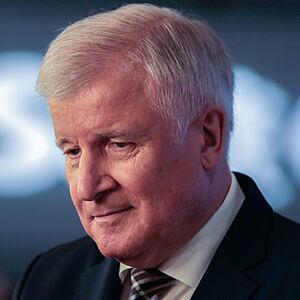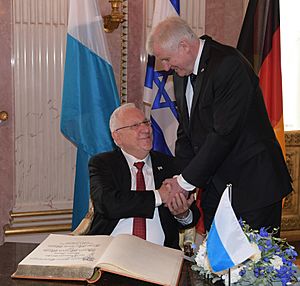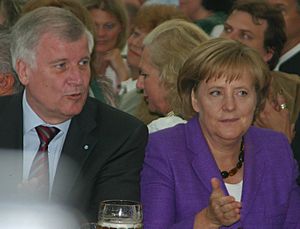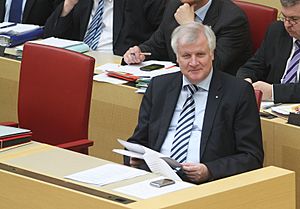Horst Seehofer facts for kids
Quick facts for kids
Horst Seehofer
|
|
|---|---|

Seehofer in 2019
|
|
| Minister for the Interior, Building and Community | |
| In office 14 March 2018 – 8 December 2021 |
|
| Chancellor | Angela Merkel |
| Preceded by | Thomas de Maizière (Interior) |
| Succeeded by | Nancy Faeser (Interior and Community) Klara Geywitz (Housing, Urban Development and Building) |
| Leader of the Christian Social Union | |
| In office 25 October 2008 – 19 January 2019 |
|
| General Secretary | Karl-Theodor zu Guttenberg Alexander Dobrindt Andreas Scheuer Markus Blume |
| Preceded by | Erwin Huber |
| Succeeded by | Markus Söder |
| Minister-President of Bavaria | |
| In office 27 October 2008 – 13 March 2018 |
|
| Deputy | Martin Zeil Ilse Aigner |
| Preceded by | Günther Beckstein |
| Succeeded by | Markus Söder |
| President of the Bundesrat | |
| In office 1 November 2011 – 31 October 2012 |
|
| First Vice President | Hannelore Kraft |
| Preceded by | Hannelore Kraft |
| Succeeded by | Winfried Kretschmann |
| Acting President of Germany | |
| In office 17 February 2012 – 18 March 2012 |
|
| Chancellor | Angela Merkel |
| Preceded by | Christian Wulff |
| Succeeded by | Joachim Gauck |
| Minister for Food, Agriculture and Consumer Protection | |
| In office 22 November 2005 – 27 October 2008 |
|
| Chancellor | Angela Merkel |
| Preceded by | Renate Künast |
| Succeeded by | Ilse Aigner |
| Minister for Health | |
| In office 6 May 1992 – 26 October 1998 |
|
| Chancellor | Helmut Kohl |
| Preceded by | Gerda Hasselfeldt |
| Succeeded by | Andrea Fischer |
| Member of the Bundestag for Ingolstadt |
|
| In office 4 November 1980 – 27 October 2008 |
|
| Preceded by | Karl Heinz Gierenstein |
| Succeeded by | Reinhard Brandl |
| Personal details | |
| Born |
Horst Lorenz Seehofer
4 July 1949 Ingolstadt, Bavaria, West Germany (current-day Germany) |
| Political party | Christian Social Union |
| Spouse | Karin Starck |
| Children | 4 |
| Signature | |
Horst Lorenz Seehofer (born 4 July 1949) is a German politician. He was the Minister for the Interior, Building and Community under Chancellor Angela Merkel from 2018 to 2021. He is a member of the Christian Social Union (CSU) party.
Before his role as Interior Minister, Seehofer served as the Minister-President of Bavaria from 2008 to 2018. He was also the Leader of the Christian Social Union in Bavaria from 2008 to 2019. He first became a member of the Bundestag (Germany's parliament) in 1980.
He held several important government jobs. These included Minister for Health from 1992 to 1998. He was also Minister for Food, Agriculture and Consumer Protection from 2005 to 2008. From 2011 to 2012, he was the President of the German Bundesrat, which meant he was the acting head of state of Germany for a short time in 2012.
Contents
Early Life and Education
Horst Seehofer was born in Ingolstadt, a city in Bavaria, West Germany (now part of Germany). After finishing secondary school, he started working as a civil servant in the local government in Ingolstadt.
Political Career
Federal Minister and Member of Parliament (1980–2008)
Seehofer was a member of the German federal parliament, the Bundestag. He represented his home area of Ingolstadt from 1980 until 2008. In the 2005 federal election, he won a large number of votes in his district.
From 1992 to 1998, Seehofer served as the Federal Minister for Health and Social Security. This was during the time Helmut Kohl was Chancellor.
In 1993, a serious issue arose involving thousands of people with Haemophilia who were infected with HIV from contaminated blood in the 1980s. As Health Minister, Seehofer ordered that Germany's Federal Health Agency be closed down. He also announced that Germany would help create a fund for the victims of this scandal.
After his party lost the 1998 federal election, Seehofer became a deputy leader of the CDU/CSU group in the Bundestag. He later disagreed with Angela Merkel, who was the leader of the CDU party, about health insurance plans. Because of this, he stepped down from his leadership role in the parliamentary group in 2004. However, he remained a deputy chairman of his party and kept his seat in the Bundestag.
From 2005 to 2008, Seehofer was the Federal Minister of Food, Agriculture and Consumer Protection in Angela Merkel's government.
Minister-President of Bavaria (2008–2018)
In 2008, the CSU party had a difficult election in Bavaria. The current Minister-President and party chairman resigned. Horst Seehofer was then chosen as the new Chairman of the CSU party. Soon after, he was elected Minister-President of Bavaria by the Bavarian state parliament. He formed a coalition government with the Free Democratic Party (FDP). This was the first time Bavaria had a coalition government in many decades.
From 2011 to 2012, Seehofer was the President of the German Bundesrat. This meant he was the acting head of state of Germany for a short period. This happened after President Christian Wulff resigned in February 2012, until Joachim Gauck was elected as the new President in March 2012.
Under Seehofer's leadership, the CSU party won a strong majority in the 2013 state elections. This gave the conservative parties good momentum for the federal elections that followed. Seehofer also helped lead talks to form a national coalition government with Angela Merkel and Sigmar Gabriel.
In 2015, Seehofer announced he would step down as Minister-President at the next state elections in 2018.

In 2017, the CSU's share of votes in the federal election dropped. Seehofer then announced he would step down as Minister-President and let Markus Söder take over in 2018.
Return to Federal Government (2018–2021)
In March 2018, Horst Seehofer became the Minister for the Interior, Building and Community in Angela Merkel's new government. He stated that he wanted a "master plan" for faster asylum procedures and more deportations. He also aimed for a "zero tolerance" approach to criminals.
Seehofer had different views from Chancellor Merkel on how to handle the European migrant crisis. He wanted to turn away migrants who had already registered in other EU countries. Merkel was concerned that this could harm the stability of the European Union. In June 2018, their disagreement almost caused the government to fall apart. There was even talk of the CDU and CSU parties splitting, which had never happened before.
On July 1, 2018, Seehofer initially rejected an agreement Merkel had made with EU countries and offered to resign. However, his party refused to accept his resignation. The next day, Seehofer and Merkel reached a compromise. They agreed on tighter border controls and that Seehofer would negotiate agreements with specific countries.
In 2021, Germany experienced severe floods, its worst natural disaster in over 50 years. Seehofer faced criticism from some politicians due to the high number of deaths.
Political Views
Immigration
In 2010, Seehofer said that Turkish and Arab migrants were no longer needed in Germany. These comments were criticized by the Turkish community and by Chancellor Angela Merkel's government.
In 2011, he added that people who wanted to stay in Germany should be ready to accept German values. He suggested changing the Bavarian Constitution to help with the integration process, but also that minorities should actively support it.
In late 2015, Seehofer and the CSU strongly criticized Merkel's refugee policy. Bavaria, his home state, was the main entry point for many refugees. Under pressure from Seehofer, Merkel later made some changes, like restricting cash benefits for refugees. He often called for a limit on the number of refugees Germany should take in, suggesting a maximum of 200,000 asylum applicants per year.
In September 2019, Seehofer stated he would accept 25 percent of migrants arriving in Italy by sea, if certain conditions were met.
Foreign Policy
Seehofer is against Turkey becoming a member of the European Union. In 2009, he said that Turkey "clearly doesn't fit in" with the EU.
In 2010 and 2011, Seehofer was the first Minister-President of Bavaria to visit the neighboring Czech Republic. This was an important step in improving relations between the two countries.
In 2014, Seehofer warned against a too-friendly approach towards Russia during the Russo-Ukrainian War. However, in 2015, he believed it was important to involve Russia in solving global problems. In 2016, his visit to Moscow to meet Russian President Vladimir Putin was met with criticism. By early 2017, Seehofer again called for the EU sanctions against Russia to be lifted.
In September 2018, after protests in Chemnitz against migrants, Seehofer said that the debate on migration was "the mother of all political problems" in Germany.
European Integration
In 2012, Seehofer asked for the German constitution to be changed. He wanted to allow public votes (referendums) on decisions to make European integration stronger and give more power to European institutions.
Other Activities
Horst Seehofer has also been involved in various other organizations:
- He was a member of the supervisory board for KfW, a German state-owned development bank, from 2005 to 2008.
- He served as Deputy Chairman of the supervisory board for Landwirtschaftliche Rentenbank.
- He was a member of the board of trustees for the German Forum for Crime Prevention (DFK) since 2018.
- He is a member of the board of trustees for the Deutsches Museum.
- He was a member of the board of directors for ZDF, a German public television broadcaster, from 2010 to 2014.
Recognition
Awards and Honors
- Grand Cross of the Order of Merit of the Federal Republic of Germany (2023)
- Bavarian Order of Merit (2008)
- Grand Cross of the Order of Merit of Portugal (2009)
- Knight Grand Cross of the Order of the Star of Italy (2014)
Honorary Degrees
- He received an honorary doctorate from the National University of Life and Environmental Sciences of Ukraine (2008).
- He received an honorary doctorate from the Lucian Blaga University of Sibiu (2010).
- He received an honorary doctorate from Qingdao University (2010).
Personal Life
Horst Seehofer is married to Karin Starck. They live in the Gerolfing district of Ingolstadt. He has four children.
In 2002, Seehofer recovered from a serious heart condition. His health became a public topic again in 2015 when he collapsed during a speech at a party event.
Images for kids
See also
 In Spanish: Horst Seehofer para niños
In Spanish: Horst Seehofer para niños



